ICSI Treatment
Intracytoplasmic sperm injection, or ICSI, is an infertility treatment that involves the injection of a single, good-quality sperm into a mature egg, which is then placed into a woman’s uterus. ICSI is a specialized form of conventional IVF (in vitro fertilization).
Conventional IVF vs. IVF with ICSI
The difference between conventional IVF and ICSI is that IVF involves retrieving eggs and sperm from a couple and allowing the sperm to fertilize the eggs on their own in a lab dish, while in ICSI, the sperm are injected directly into the eggs.
ICSI is most often recommended when couples are dealing with male infertility problems, such as low sperm count, poor sperm quality, previous vasectomies, or difficulty ejaculating. It is also used when a previous IVF procedure has failed, or when very few eggs can be collected during the egg retrieval process.
ICSI Success Rates
In general, the successful rate of egg fertilization using ICSI is about 70-85%. This is often higher than the fertilization rate of IVF without ICSI.
However, this success rate is not the same as the rate of pregnancy following ICSI. Whether or not a woman becomes pregnant after the procedure will depend upon the quality of the resulting embryo, whether or not the transfer of the embryo into the uterus is successful, and whether or not implantation (the process of the embryo attaching to the wall of the uterus) is successful. Understanding your embryo quality up front can help you determine how best to approach treatment.
ICSI Cost
ICSI itself costs around $1500. However, it is important to remember that ICSI is not used on its own. This $1500 will always be in addition to the cost of IVF. The embryos created with ICSI must still be inserted into the mother or a surrogate. IVF can range widely in price depending on location, medications used, or other add-ons such as PGD.





